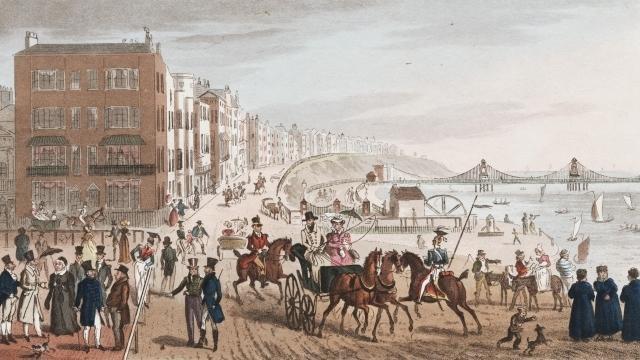
Characters on the Steyne, Brighton, Cruikshank, Robert, 1789-1856
Romantic-period literature played a pivotal role in the formation of contemporary markets for land through its celebration of the natural environment and water views. Reacting to the enclosure movement and mass urbanisation in England, Romantic literature rhetorically commodified “wild” and “natural” spaces, creating and popularising tropes for linguistically packaging land, tropes which continue to be deployed in real estate copy today. British Romanticism’s potential to market space is perhaps most obvious in the growth of domestic tourism and the popularity of William Wordsworth’s A Guide through the District of the Lakes. However, the extent that new aesthetic approaches to “wilderness” shaped attitudes towards buying, renting, and developing property remains understudied. Jane Austen’s last novel Sanditon (1817) suggests that Romantic poetry celebrating the ocean contributed to the popularity of English seaside resort towns and impacted the viability of speculative coastal developments. This talk will attempt to trace the close interconnections between Romanticism and the modernisation of the land market in England, dwelling on Austen, Wordsworth, and culminating in the copy of infamous nineteenth-century auctioneer George Robins. Robins might be, for some scholars, the “father” of modern real estate advertising but he was also sardonically characterised in newspaper columns as a landscape poet. This talk argues that these two things are inseparable.
Dr Amelia Dale is a Lecturer in English at the Australian National University. She has held positions at Nanjing University, SUIBE and the University of Sydney, where she received her PhD in eighteenth-century literature. Her research centres on eighteenth-century and Romantic literature and culture, with particular interests in book history, gender and genre, and histories of the body. Her monograph, The Printed Reader: Gender, Quixotism, and Textual Bodies in Eighteenth-Century Britain (Bucknell University Press, 2019), examines British adaptations of Miguel de Cervantes’ Don Quixote to argue that literature was envisaged as imprinting the reader’s mind, character, and body in gendered ways. It was short-listed for the British Association of Romanticism’s First Book Prize. Dr Dale is editor of The Shandean and interviews editor for the poetry journal Rabbit. Her work has been supported by the Australian Academy of the Humanities, the ARC Centre for Excellence for the History of Emotions, Yale University Lewis Walpole Library and Chawton House.
Please note that the School of History seminars will run in-person only this semester.
Location
Speakers
- Dr. Amelia Dale
Event Series
Contact
- David Romney Smith